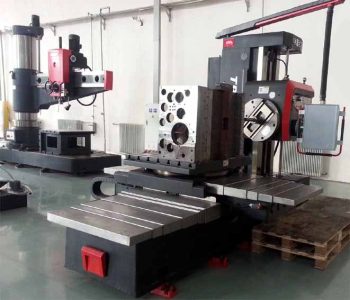The processing of CNC boring machine is mainly a machine tool that uses a boring tool to boring holes on the workpiece. Generalmente, the rotation of the boring tool is the main motion, and the movement of the boring tool or the workpiece is the feed motion. Its machining accuracy and surface quality are higher than those of drilling machines. CNC boring machine is the main equipment for processing large box and shell parts. It has the characteristics of not moving the workpiece during processing, allowing the tool to move, aligning the center of the tool with the center of the hole, and turning the tool (main movement).

CNC Boring Workshop
CNC boring machines are divided into three types: horizontal boring machines, coordinate boring machines and diamond CNC boring machines. Próximo, I will give you a specific introduction:
(1) Horizontal boring machine. It is one of the most widely used boring machines. Mainly for hole processing, the boring accuracy can reach IT7, and the surface roughness Ra value is 1.6~0.8um. The main parameter of the horizontal boring machine is the spindle diameter.
(2) Coordinate system boring machine. Jig boring machine is different from horizontal boring machine. It is a kind of high-precision machine tool and has the structural characteristics of a precision measuring device with coordinate positions.
CNC coordinate boring machine can be divided into: single-column coordinate boring machine, double-column coordinate boring machine and horizontal coordinate boring machine.
The single-column coordinate boring machine uses the spindle to drive the tool to make the main rotation movement, and the spindle sleeve makes the feed movement in the axial direction. It has the characteristics of simple structure and convenient operation, which is especially suitable for processing precision holes of plate-shaped parts. But because of its poor rigidity, it is only suitable for small and medium-sized coordinate boring machines.
The double-column coordinate boring machine is based on the main movement of the tool installed on the main shaft, and the workpiece is installed on the worktable to move longitudinally and linearly along the bed guide rail. And because of its good rigidity, the current large-scale jig boring machines basically adopt this structure.
Different from the above two, the worktable of the horizontal coordinate boring machine can be rotated in the horizontal plane, and the feed movement can be realized by the longitudinal movement of the worktable or the axial movement of the spindle. Compared with the above two products, its processing accuracy is higher.
(3) The diamond boring machine has the characteristics of processing with a small feed rate and a high cutting speed. Por lo tanto, the workpiece processed in this way has high dimensional accuracy (IT6), and the surface roughness can reach 0.2 microns.
Generalmente, the rotation of the boring tool is the main motion, and the movement of the boring tool or the workpiece is the feed motion. It is mainly used to process high-precision holes or finish machining of multiple holes at one time, and it can also be engaged in the machining of other machining surfaces related to hole finishing. Using different tools for drilling, milling and cutting, its machining accuracy and surface quality are higher than those of ordinary drilling machines. CNC boring machine is the main equipment for processing large box parts. The thread of the workpiece and the processing of the outer circle and the end face, etc..
Operating procedures for milling and boring parts
1. Follow the general safety rules for milling and boring workers. Wear labor protection equipment as required.
2. Check whether the connection of the operating handle, switch, knob, fixture mechanism, and hydraulic piston is in the correct position, whether the operation is flexible, and whether the safety device is complete and reliable.
3. Check whether there are obstacles in the effective running range of each axis of the machine tool.
4. Use beyond the performance of the machine is strictly prohibited. Select a reasonable cutting speed and feed according to the workpiece material.
5. When loading and unloading heavier workpieces, a reasonable spreader and lifting method must be selected according to the weight and shape of the workpiece.
6. When the spindle rotates and moves, it is strictly forbidden to touch the spindle and the tool installed at the end of the spindle.
7. When replacing the tool, the machine must be stopped first, and can be replaced after confirmation. When replacing the tool, attention should be paid to the damage of the blade.
8. It is forbidden to step on the rail surface and painted surface of the equipment or place objects on it. It is strictly forbidden to knock or straighten the workpiece on the workbench.
 English
English العربية
العربية 中文(漢字)
中文(漢字) Čeština
Čeština Dansk
Dansk Nederlands
Nederlands Suomi
Suomi Français
Français Deutsch
Deutsch Italiano
Italiano 日本語
日本語 ಕನ್ನಡ
ಕನ್ನಡ 한국어
한국어 Português
Português Русский
Русский Slovenčina
Slovenčina Español
Español Svenska
Svenska Türkçe
Türkçe

